Updated 6/9/23. While some comments have questioned the validity of the state-funded research on the correlation between travel, snorkeling, and drowning, it was a 3-year project that clearly dispelled the notion that deaths were from inhaled water. It could not definitively be sure whether long flights before snorkeling may have played some role, and more research is needed. On the other hand, it could not eliminate that concern either, and thus the suggestion of caution in that regard is indicated. The study’s leading investigator confirmed additional studies are needed “to determine both the effects of high altitude on those with certain types of lung disorders, as well as in those without any.”
Could there be a correlation between recent airline flights and snorkeling deaths? A Snorkel Safety Study suggests that could be the case. We were reminded of this by a comment from Tim, who mentioned last week’s tragic drowning at Electric Beach (pictured) on Oahu’s southwest coast.
While it isn’t clear either the victim’s exact age (he was in his 40s), or the date he had flown to Oahu. However, regular BOH visitor Tim just wrote:
“One more (warning) to add to the list is to not snorkel within a week or so of flying to Hawaii. You probably saw the article last week of the husband and wife on honeymoon and were snorkeling, and the husband died and was found unresponsive near the shore…Do some research on this subject of snorkeling after flying and be safe. There are enough dangers with the ocean, no reason to add one that can be prevented.”
We’ll add too that thieves stole the rental car and belongings of the visiting couple.
The potential relationship between flying and snorkeling deaths.
Hawaii visitor deaths caused by drowning remain far too familiar. Last summer, another drowning raised questions about the correlation between air travel and snorkeling deaths. That death was near the Big Island’s Mauna Kea Beach Hotel, and the deceased was a 61-year-old male from Oregon. An autopsy revealed no information about any relationship between his recent flight and the drowning.
The Snorkel Safety Study suggested the following:
- Don’t snorkel for several days following transpacific flights. This advice is as applicable to Hawaii residents as it is to Hawaii visitors.
- The safest snorkels are those that don’t have modifications to the tip to prevent water from entering the device.
- Choose snorkeling locations where you can touch the ocean bottom for additional safety.
- Snorkeling requires proficiency in swimming. If you aren’t able to swim, you should not be snorkeling.
- When visitors drown in Hawaii, snorkeling is the most likely associated activity.
Low 02 levels rather than inhaled water may be associated with many Hawaii drownings.
The state-funded study indicated most of visitor drowning deaths were not related to inhalation of water, as had been previously believed. Drownings, instead, are largely the result of a low blood oxygen level associated with lungs having a buildup of fluid. The name for this is ROPE (rapid onset pulmonary edema), which is the result of hypoxia.
Will this answer the question we’ve asked countless times, why do visitors die from snorkel-related drowning so much more than residents?
Research found a correlation with pre-existing coronary conditions.
Men with a heart condition who are middle age, have a higher risk. So gender and age also play a role as contributing factors when it comes to drownings.
Many victims are face down in the ocean when they die. This is because of muscle fatigue and losing consciousness which leads to ROPE. When someone dies this way, there is little to no struggling considering the victim is breathing in water.
Most snorkeling victims in Hawaii are visitors.
Looking at the last 200 Hawaii snorkeling deaths, visitors accounted for 90% of them. That’s ten times more than for locals. On average, every week, we see one visitor die this way. There were 84 drownings in the latest year studied. Other accidents were primarily attributable to hiking and car crashes.
A new Hawaii state ocean safety website can help.
Bridget Velasco, the DOH coordinator, said, “Keeping everyone who goes to the ocean safe is a top priority.” On their website, you’ll find information on many things, including lifeguarded beaches, ocean conditions, and warnings. The website also has accident information and a list of beaches where there are the most injuries.
“If in doubt, don’t go out” is the common theme you will hear.
Tip from BOH: We’re ocean swimmers but usually follow the shoreline rather than swim straight out. Keep in mind that one recent drowning victim was 300 feet from shore. We also suggest snorkeling when the surface of the ocean is smooth, and always check how far you are from the beach.
Top Ten Hawaii Beach Safety Tips.
Issues can include strong currents, wave surges, and seasonal variations in ocean conditions, among others. Be alert, do not turn your back on the ocean, and follow these suggestions for your Hawaii vacation:
1. Remember that the ocean is unpredictable and stronger than you are. Show respect.
2. Beaches with a lifeguard are safer. Whatever beach you are on, locate the rescue tube station before going in.
3. Obey warning and closure notices on beaches.
4. Lifeguards can answer any question about ocean conditions.
5. Stand on the beach before entering to observe what’s happening and look for giant waves that can appear in groups.
6. Ocean safety brochures are in your hotel room or vacation rentals.
7. Check out the Hawaii Beach Safety website from the Hawaii State Department of Health.
8. Know how to deal with rip currents.
9. Review our Hawaii jellyfish update and calendar to avoid encounters and stings.
10. Be careful of rocks below the surface, and don’t stand on wet rocks along the beach where unexpected waves can appear.
Still some of the deadliest Hawaii beaches.
Surprisingly, the deadliest beaches may not be those that first come to mind. Many drownings occur at some of the smoothest water beaches where visitors are snorkeling or swimming.
Hanauma Bay – Oahu
Waikiki Beach
Black Rock – Maui
Kahanamoku Beach and Lagoon – Oahu
Molokini – Islet off Maui
Some of the Most Dangerous Hawaii Beaches.
Dangerous beaches in terms of injury but not mortality include the following. If your beach isn’t listed, it doesn’t mean you shouldn’t have concerns:
Makena Beach – Maui
Hapuna Beach – Big Island
Sandy Beach – Oahu
Brennecke Beach (Poipu) – Kauai
Laaloa Beach – Big Island
Please add your thoughts about ocean safety! Mahalo.
Get Breaking Hawaii Travel News
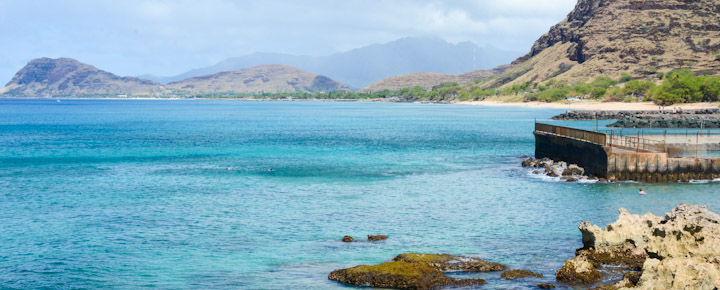
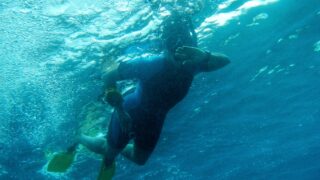

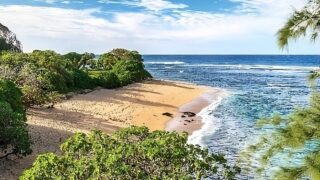
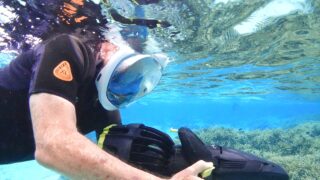
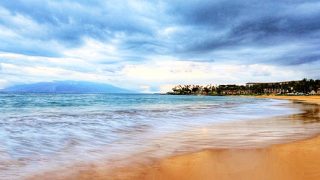
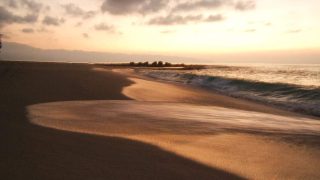
Rapid Onset Pulmonary Edema (ROPE)
Every week we hear how a visitor to our islands died of apparent drowning?
Sure we not the only place?
Basically anyone travel by air 5hrs or more may be in danger.
Hawaii has a Kuleana. Eliminate a tragic vacation. Id like to hear more on this issue and stop hearing of another visitor has drowned.
Mahalo for being able to express. Served in Hawaiis Hospitality and Visitor Industry over 25years.
You should find some physiological proof of flight travel relating to snorkeling deaths prior to peddling such a story. As a medical doctor I have to tell you, you have no proof for such a story. This is a gross extrapolation from scuba diving medical issues related to flights. But that is due to significant changes of partial pressures affecting the compresses gasses in a dive tank. That phenomenon is well documented. But not relatable at all to simple snorkeling. You should correct your post and reframe from displaying mis-information.
My boyfriend almost died off Black Rock Beach from ROPE-per his MD at Maui Memorial Medical Center. We flew in, drove up & down Haleakala (twice-bike ride the 2nd trip) and snorkeled several times. Our big mistake was going around Black Rock & thank God we had our phones in waterproof waist bags And we stayed together. We barely got him onto the rock in the first place, he “couldn’t breathe” & was very weak. Called 911 & Maui’s amazing rescue guys found us on a rock. He was still talking & looked good But his pulse Oxygen level was 84. He spent the night at Maui Memorial with some oxygen level issues, by the next day all was normal. Note-he is a brass musician with abnormally large lung volume which may have saved him. We are both in our 60’s & out of shape but with lots of experience swimming.
Aloha! I bought a full mask snorkel that doesn’t have the tube that goes up above the water. I’ve been reading bits & pieces that there may be a connection between snorkel drowning & low 02 from the masks. I will use it for Very limited time when I snorkel. I think there needs to be real studies on this. Mahalo & have a great day!
Aloha, Are they keeping track about how many of the deceased were using the full face snorkel masks?
In Bali and Costa Rica many tourists drown as well.People on vacation can be less cautious and many of them have little knowledge of the power of the ocean.
Hi guys , I see this sad incident is hitting All the news wires . I would be curious if the police are able to figure out who the thieves were, I imagine the police have suspects as this theft of personal belongings and cars is nothing new .
Safety advice for Snorkelers from the Snorkel Safety Study
• If you can’t swim, don’t snorkel
• Familiarize yourself with your equipment in shallow water
• If you have a heart condition, consider not snorkeling
• Avoid snorkels with constricted airways. Simpler the better
• Swim with a buddy
• Keep an eye on your buddy
• Stay where you can touch the bottom
• Be confident before moving to deeper water
• Check your location frequently. Every 30 seconds.
• Do not exercise or increase exertion while breathing through a snorkel
• If you suddenly become short of breath or fatigued signal for help and get out of the
water immediately
• Consider waiting 2-3 days after extended air travel before snorkeling
All wise advice. I hope many people read your post. I was in Mexico on a snorkeling excursion out of Cozumel with two other people. We were taken a few miles from shore to snorkel. I thoroughly enjoyed the experience. I and a buddy kept swimming farther and farther from the boat without realizing we were drifting away. Thankfully another friend who joined us had swam back to the boat. The tour operator wanted to leave. Our friend kept telling the operator he could not leave because two people were still in the water. Thank God our friend was on board the boat to make sure it did not leave without us.
If it this bad tourist should not snorkeling at all! Gear is key! All the cheap kits should be illegal to sell! That cheap snorkeling kit is rubbish! I spearfish and my not beat but its good gear cause it’s my life! My mask is $85 fins $150 wetsuit $350 weight $50 gloves $20 ect. Also took classes on diving and breathing maybe tourist need to take classes. Also tides, current, swelles, wind, moon, time of day, color of water, play a part!
Thanks for the june 9 update on this subject . Using extreme caution in any water activity in hawaii is probably the best plan . Once I saw a family of 4 on inner tubes being pulled out to sea and not aware of the red flags on beach warning of dangerous current.Not sure if this is correct but I was told any military member doing body surfing in hawaii could face disciplinary action . Too many military members have been severely injured body surfing in hawaii . Obviously some beaches like Sandy beach are extremely dangerous. Use caution in ocean in hawaii and never go in ocean after drinking .
Hi Tim.
Thanks. Editor Jeff once nearly drowned at Sandy Beach and he is experienced.
Aloha.
Your article mentioned that “low blood oxygen levels” could be a cause of these drownings. You can purchase reliable devices to measure your blood oxygen levels before you snorkel if that is a concern.
Recommending a policy of waiting a week to snorkel upon arrival to Hawaii is ridiculous. Most visitors only spend a week there for many will snorkel.
There are multiple reasons for fatalities.
1. Poor health.
2. Full face mask snorkels
3. Snorkels with a small bore or with gadget on top to keep them dry.
4. Along with item number one many people do not know the limitations.
5. And unfortunately, many snorkelers are poor swimmers and do not belong in the water.
So your suggestion of recommending people not to snorkel for seven days makes no sense.
Hi Chuck.
We just conveyed the study’s recommendation of “several” days.
Aloha.
This is total nonsense. All the people that drowned were tourists who were unfamiliar with the beaches and conditions. They fly in and haven’t snorkeled in years or never, don’t know how to use a mask and snorkel properly or have high blood pressure, heart disease, diabetes etc and try to snorkel. Also those new masks that you see that cover the whole face, they are very unsafe,, several people have drowned using them. This article doesn’t cite any data from the autopsies correlating air travel to the drownings. The questions you have to ask yourself 1) what preexisting health conditions did they have2)what experience with snorkeling did they have 3) what equipment were they using 4)how well could the
I completely agree. It will be really interesting if Any correlation can be found between the effects of flying and deaths from snorkeling. Of course, it’s more likely that if visiting snorkelers die within a week of flying, it’s because They’re Visitors! Many (most?) stay only a week.
Check your math: if visitors account for 90% of drowning that leaves 10% of the drownings for locals. That’s nine times more not ten times more. But what really matters, if you want to provide useful information about risk, is the rate of drowning divided by the number of snorkelers in each group. Considering that visitors just do a ton of snorkeling, can you show that they’re actually getting drowned at a higher rate per snorkeler than locals are? Same idea for Hanauma Bay — put a million people in the water a year and somebody is bound to die of natural causes — but is that really a hazardous site, or is it just a site with a lot of people, who happen to die at normal rates while they’re in the water?
Reading reports of snorkeling incidents over the years, I’m highly suspicious that there’s an element of negative pressure pulmonary edema going on. This would explain the increased incidence when anti reflux snorkel valves are involved. That causes an acute right heart failure, which could be detrimental to those with preexisting conditions.
I’m not sure I believe in a link to flying, other than planes bringing lots of inexperienced snorkelers.
I have a cousin in her 60s who a couple of days after being released from the hospital from a case of pneumonia flew 12 hours non-stop to Hawaii and a couple of days later went snorkeling. Though a little winded there were no other problems.
Having read the article mentioned in another post it is mentioned that other places seem to have this problem also but they don’t do as extensive an autopsy as Hawaii does so they may lack the information.
It does seem that this would be a good subject for an in depth study. Is it health, or equipment, or both or neither? Inquiring minds want to know.
As a surf photographer I cant tell you how many clueless and arrogant people I see in the ocean on a regular basis. Even after they’re warned about beach hazards, they choose to ignore the info because they think they know better. Then that puts the lifeguards & other people in the water at risk when they have to try and save these people.
My best advice would be always read all the warning signs especially if there’s flags out that day. Always listen to the lifeguards and don’t try to argue with them. Be aware that the weather & ocean conditions can change very rapidly. If the waves are big, don’t be on the wet sand or rocks & never turn your back on the ocean. Also if you aren’t an active person, snorkeling will probably be difficult!
Maybe you could try to treat people with respect and kindness instead of labeling them “clueless and arrogant”. Hawaii surf localism is infamous, the water should be available for all to use. If you or surfers don’t want to help others that helps explain why Hawaii has so many drownings. As for me, I have always helped any local or tourist that gets in trouble in the water here in So Cal. California has millions of beach users and only a few drownings a year, because we value human life and employ thousands of beach lifeguards.
Hawaii should be ashamed of the deaths they tolerate. Shame on Hawaii.
Aloha Beat of Hawaii. I’ll add my personal knowledge to this topic.
As a Certified Open Water Diver in wetsuits and drysuits with thousands of dives, the only issue with flying and Scuba Diving is the risk of nitrogen narcosis when deep diving and flying in an unpressurized aircraft.
The obvious correlation between tourists and snorkeling is going under water.
The exertion of doing any sport you’re not accustomed to will bring out the flaws or medical issues that went previously unnoticed.
Snorkeling in a swimming pool could have the same effect on different individuals.
Mahalo Nui Loa for bringing up the topic.
Hi Pam.
We learn something new about you all the time! Thanks for that.
Aloha.
Much Aloha Beat of Hawaii!
I’ve lived a blessed life and experienced several lifetimes in my years on this big blue planet.
If you haven’t seen the movie, Big Fish, it’s amazing.
You’re the best!
Hi Pam.
Thanks! Back at you. No, none of us has seen that, but we’ll have a look. Have a great weekend.
Aloha.
Pamm, yes Big Fish is a wonderful and enchanting fantasy. Absolute Family favorite. One of the few movies that we can watch again and again. Thanks for the info as well. Being a year removed from open heart surgery, I was thinking about getting back to snorkeling when we return to Kauai. However, after reading these posts, I’ll find other ways to spend my time. Easy to do when you’re in paradise.
Thanks for the info, it’s very useful.
Hi Roy.
Thanks and good to hear from you. Where are your travels taking you? Perhaps not back here.
Aloha.
We are coming back to Kauai later this year.
Hi Roy.
Welcome back. Please stay in touch if it works to meet up.
Aloha.
Checkout SnorkelPlanet.com about snorkeling after flying. My opinion, this website makes sense. Do your homework, don’t take the advice in these comments. These comments are helpful because they make us think and research a subject. Talk to your doctor and do your own research.
Hi Guys, my only advice is not to drink any alcohol before going into the ocean anywhere. It’s just too unpredictable when you are out there. Be safe everyone. Aloha and many Mahalos to Rob and Jeff for their wonderful website and keeping busy informed of all the news.
I’m a retired commercial pilot and was based in HNL. I’ve done decades of flying and diving. There is absolutely Zero correlation between snorkeling and flying, assuming a normal, healthy individual. Both snorkelers and swimmers breathe atmospheric air that is not under any extra pressure.
Different rules for SCUBA, however. DCS – decompression sickness (The Bends) happens when nitrogen gas that has been absorbed into the body from breathing SCUBA tank compressed air comes out of solution too quickly. Like when you go from a higher pressure environment (e.g. any depth below sea level) to a lower pressure one (e.g. sea level and higher).
DCS is extremely dangerous and one must avoid it – period. 12 to 24 hours from dive to fly.
I disagree. This study Does indicate correlation between flying and snorkeling deaths. However as we should all know correlation is not necessarily causation. The ‘story’ is full of ‘May’s and ‘could’s which will now get parroted around the internet as fact.
That correlation could easily be explained by the fact that most of the inexperienced snorkelers in the water also happen to be recent flying visitors. To really look at this data you’d have to see a similar pattern for experienced snorkelers who recently flew.
Well, you can disagree all you want, but that’s simply the facts. Snorkeling and flying afterwards have zero correlation. Snorkelers don’t get “The Bends”. The premise that they do means one has zero understanding of the physiology involved in snorkeling vs. SCUBA.
SCUBA and free-diving?? Like we said; a different story.
I believe they should study which type of snorkel is associated with the drownings. I think the separate mask and snorkel allows for more intake of air/oxygen and may not be as much of a threat to downing. I snorkel as a resident for the past four years with a separate snorkel and mask and my lungs can take in a lot with the 21st snorkel. I tried the all in one mask and felt claustrophobic. I think the problem could be related to a recent transatlantic flight and if you try to swim hard with that one piece snorkel you may asphyxiate yourself before you know it.
People come all the way to Hawaii to snorkel, and then you tell them to wait 7 days after flying before doing so?! That may be their entire vacation.
Also, Hawaii is not the only destination people fly to to go snorkeling. Have you checked the statistics of those places also?
There is absolutely no reason not to go snorkeling, swimming, walking, or having a beer at the bar after a five hour flight. Your body is taken to a 6,000 to 8,000′ cabin altitude, depending on the aircraft, for five hours, just as if you were on a long drive in the mountains. The only thing you don’t want to do is to fly, for at least 24 hours, after SCUBA Diving. And that is for an entirely different reason, involving breathing compressed air. But snorkeling or swimming do not require any time period after flying to be safe.
It’s probable that people in distress when snorkeling would be in distress anyway, due to pre-existing conditions.
I’m not sure that there is any correlation between flying and snorkeling. Here is my reasoning. Most Hawaii visitors are here for a week or ten days. This makes it highly likely that they’ll be snorkeling during that week. I think the biggest problem is lack of experience and not paying proper respect to a powerful ocean
Huh I wonder why snorkeling is an issue but not Scuba? Maybe the air tank?
Hi Guys, my only advice is not to drink any alcohol before going into the ocean anywhere. It’s just too unpredictable when you are out there. Be safe everyone. Aloha and many Mahalos to Rob and Jeff for their wonderful website and keeping busy informed of all the news.
Nope, not buying this warning Unless you have a preexisting medical condition associated with your heart and/or lungs. The most important water safety rule for me is Never turn your back on the ocean. While I might enjoy seeing the results of a woman losing their bathing suit after getting rolled up the beach it is still not a good thing to do.
Nice how the local thugs showed their spirit of Aloha by stealing their car, too!
Correlation doesn’t equal causation. Do you know how many thousands of people fly to Hawaii and snorkel? That’s sounds crazy. Our family reunion had 35 people snorkeling a few days after arriving, one of them in their 80’s with dementia and did fine. I don’t know, it sounds far fetched.
I don’t think people realize how much different the ocean is in Hawaii,I live in CA and does not compare, Shore break will knock you off your feet in Hawaii.
I second that opinion. Grew up in Texas, all my life swimming in the Gulf of Mexico and never once had I any troubles on Texas beaches, none.
I was completely unprepared for the strength and unpredictability of the ocean here. The strength of the currents in HI are a force Not to be reckoned with, you will lose. Hell, I know now, You Do Not turn your back on the ocean. It didnt take long for me to learn that lesson at Electric Beach. Fortunately, my experience didnt turn into a life threatening one, but it certainly could have been had I panicked.
Sure, I’ve seen and read all the warning signage before, in Texas. I also noticed and read all those exact same familiar warning signs here. My F up was naively expecting TX in HI.
Snorkeling after flying should not be a problem. You shouldn’t scuba or snuba for at least 24 hours after flying.
Sorry, that’s not correct. You have to wait a minimum of 18 hours After Scuba Diving to fly or go to altitude, 24 hours is better. You can totally fly Before diving, with no issue.